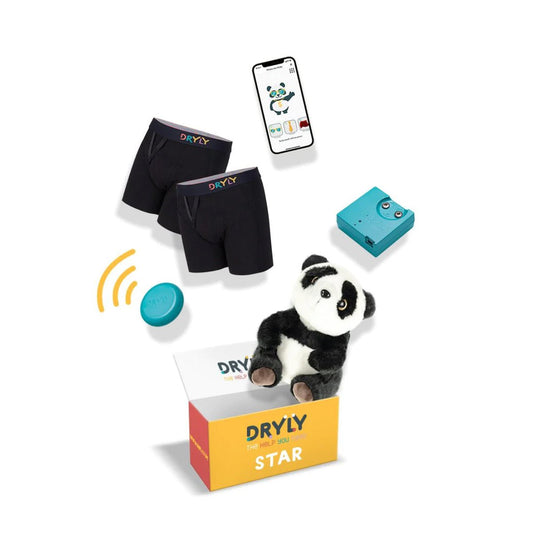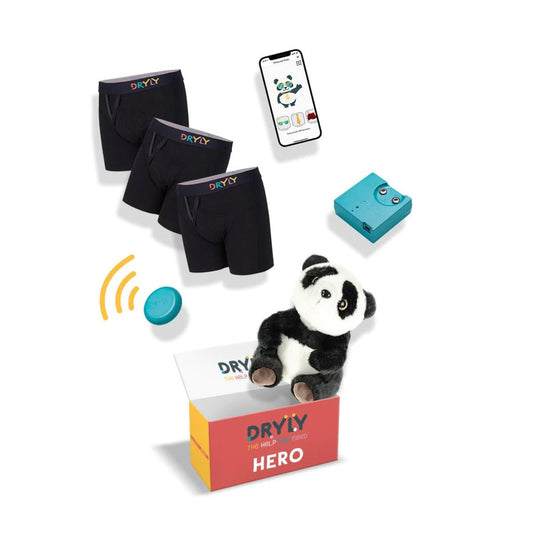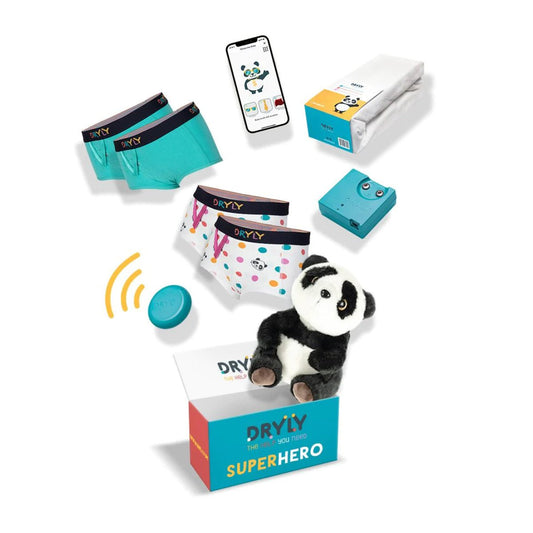Urinary problems in children, causes, solutions and advice
Bedwetting problems in a child are more common than you think. Yet for many parents, it is still unclear what they can do about it. Should you consider medication right away? Or do you start already with the bedwetting alarm? When a child wets the bed, it is not only annoying for the child, but also for the whole family. Bedwetting can have a major impact on your child's self-esteem. The feeling of shame can lead to insecurity and even a negative self-image. It is important to take these problems in a child seriously and look for an appropriate solution.

When do we speak of a bedwetting problem in children?
Bedwetting is often not considered a problem until a child still wets the bed with regularity after the age of six. Until this age, it is usually a matter of time. Many children grow out of it on their own. But if it persists, it's a good idea to take action. Not only to achieve dry nights, but especially for your child's well-being and self-confidence.
For many children, potty training is relatively smooth during the day, but achieving potty training at night is often a different story. During sleep, it is very difficult to maintain bladder control. Most children become toilet trained at night between 3 and 7 years of age. Still, it is common for children to still wet the bed later in life, this does not mean that there is something wrong with your child. Every body develops at its own pace!
So it is important to understand that urinary problems in children are not a sign of laziness or lack of commitment. The control from the brain to the bladder is simply not yet fully developed. Fortunately, there are several ways to help your child achieve nighttime potty training, such as using a bedwetting alarm!
Recognizable urinary problems in children?
There are a number of recognizable urinary problems, as it is not always immediately clear. Some children often urinate small amounts, while others hold their urine for a long time. Signs such as sudden urgency, dripping, or accidents during the day can also indicate a bladder problem. Also pay attention to the following physical signs: fidgeting, crossing legs, or regularly running to the toilet without actually urinating. These are all indications that something is not quite right and may point to urinary problems.
Pediatrician
What pediatricians see a lot of is children with bedwetting problems or difficulty with their potty training. For example, the children have bedwetting accidents during the day, pee too often or not enough, have recurring bladder infections, still pee in their bed, can't pee (out), or have delayed or disrupted potty training.
These problems can obviously have a major impact on the life of the child and family. It is a difficult topic to talk about for both parents and children.
Causes of daytime urination problems child
Most children who suffer from urine leakage do not have a physical problem. They are perfectly normally developed, but have a disorder of bladder filling, bladder emptying or a combination of both. All the different types of problems can have different causes, for example:
- A bladder infection (sometimes with and sometimes without fever or associated symptoms)
- The child constantly feels urges and ignores them
- The child has improper urination technique or holds the urine too long
- Problems with defecation
Causes of bedwetting at night
Bedwetting almost never has a physical cause. A physical problem can of course be ruled out by a family doctor or pediatrician. Bedwetting, however, is a very common problem among urinary problems in children. We speak of bedwetting when children aged 5 or 6 years old, urinate in bed more than twice a week. Causes may include:
- Sometimes heredity plays a role: for example, one of the child's parents was dry late at night
- It may be that the child sleeps so deeply that the brain does not recognize the signal of a full bladder
- Finally, children may have a small bladder or create too much pee in their sleep
Outpatient clinics
Especially for children who have difficulty urinating, several hospitals have special outpatient clinics specializing in those urinary discomforts. The goal is to discover the cause of the problem and to teach your child normal urination behavior. The doctor will always rule out physical problems. This special clinic may have a different name in each hospital, such as urinary clinic, pipopoli or pediatric incontinence clinic. So it takes some searching on the hospital website to find the right clinic.
The bedwetting alarm as a first step
A bedwetting alarm is an effective tool for making children aware of urination behavior. The bedwetting alarm consists of a sensor that is placed in your child's underwear and signals when moisture is detected. This way, your child wakes up the moment he or she begins to urinate. In this way, your child learns to recognize and can respond to the urge to urinate.
For many families, a bedwetting alarm offers a solution; it requires patience and consistent use. Most children need 2 - 3 weeks before the bedwetting alarm is effective. Still, research shows that it offers relief for many children with urinary problems.
When is medication needed?
If the bedwetting alarm has no effect after sufficient use (do give this time), a doctor may consider medication. The most commonly used medication for a child's urinary problems is Minrin. This drug contains a synthetic form of the hormone ADH and reduces urine at night. Medication is often used temporarily, such as during sleepovers or when rapid improvement is desired, do so only in consultation with your doctor.
Overactive bladder and bladder training
There are also children who suffer from an overactive bladder; they constantly feel the urge to urinate, even when the bladder is not yet full. This can also lead to bedwetting at night. In this case, daytime bladder training can help. Your child learns to hold up the pee a little longer, so that the bladder slowly enlarges. In some cases, temporary medication is given to help the bladder relax. This is done mainly under medical supervision.
Always consult your doctor
So when your child has urinary problems, it may be wise to consult with a doctor/general practitioner. They can look with you to see what the best approach is, in most cases the bedwetting alarm is chosen. The bedwetting alarm is reimbursed by a large part of the health insurance companies in the Netherlands, are you curious about this? Check it out here!
So what can be done for bedwetting problems in children?
Bedwetting problems in a child are annoying, but fortunately there are several ways to deal with them. In most cases it is a phase that passes on its own, but sometimes a little extra help is needed. The first step is usually to use a bedwetting alarm; if this is not enough, there are several medication options available. It is important to look carefully at what your child needs and discuss this with your doctor.
Do not leave your child's problems unsaid. The sooner you take action, the sooner your child will experience dry nights and more self-confidence!
Want to learn more about how to use a bedwetting alarm or what is best suited to your situation? Then take a look at our website, or contact us. We are happy to help you with the bedwetting alarm!
Frequently asked questions causes of bedwetting
What are the most common causes of bedwetting?
Bedwetting is often caused by a combination of factors such as a small bladder, deep sleep, heredity and sometimes stress.
Consequently, these are the most common causes.
Can bedwetting occur without a clear cause?
Yes, in many children there is no obvious medical cause, it may have to do with bladder and nerve development.
Does heredity always play a role in bedwetting?
Not always, but children with history are more likely to have bedwetting.
-
Dryly® Bedwetting Alarm Star
Normal price 199.99Normal priceUnit Price / per255.95Offer price 199.99- Guidance via mobile app
- Underwear plain 2-pack
- Optional vibration function
- Wizzu (panda cuddly toy)
- Transmitter & receiver
Sale -
Dryly® Bedwetting Alarm Hero
Normal price 229.99Normal priceUnit Price / per278.94Offer price 229.99Most chosen- Guidance via mobile app
- Underwear plain 3-pack
- Optional vibration function
- Wizzu (panda cuddly toy)
- Transmitter & receiver
Sale -
Dryly® Bedwetting Alarm Superhero
Normal price 259.99Normal priceUnit Price / per330.92Offer price 259.99Best deal- Guidance via mobile app
- Extra mattress protector
- Underwear plain 2-pack
- Underwear print 2-pack
- Optional vibration function
- Wizzu (panda cuddly toy)
- Transmitter & receiver
Sale
Frequently asked questions toilet training at night
From what age do you start toilet training at night?
There is no set age at which to begin nighttime potty training. Each child develops at his or her own pace. A good time is when your child is potty trained during the day, and has motivation to work on this himself. This usually begins from the age of 5 years old.
What if my child continues to bedwash at night despite nighttime training?
If bedwetting persists longer, such as after age 6, there may be nocturnal enuresis. This is often not psychological, but physical in nature. A bedwetting alarm is an effective aid. When in doubt, you can always consult a doctor.
Does it help to drink less before sleeping?
Limiting fluid intake before bedtime can sometimes help, but it is important to do so in a healthy way. Give your child plenty to drink during the day, and avoid sugary drinks in the evening. Always make sure your child pees before bedtime!
Is the use of a bedwetting alarm effective?
Yes, pee alarms have been used effectively in nighttime potty training for decades. A bedwetting alarm helps children become aware of the sensation of a full bladder. This helps children gain a lot of confidence and speeds up the process considerably.






